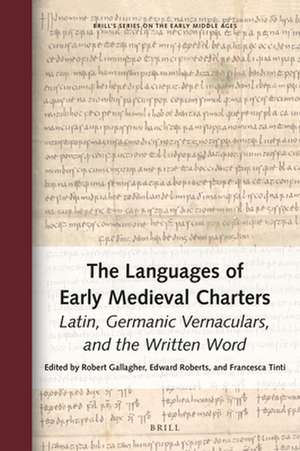The Languages of Early Medieval Charters: Latin, Germanic Vernaculars, and the Written Word: Brill's Series on the Early Middle Ages, cartea 27
Robert Gallagher, Edward Roberts, Francesca Tintien Limba Engleză Hardback – 25 noi 2020
Contributors are: Stefan Esders, Albert Fenton, Robert Gallagher, Wolfgang Haubrichs, Charles Insley, Kathryn A. Lowe, Rosamond McKitterick, Rory Naismith, Janet L. Nelson, Edward Roberts, Annina Seiler, Marco Stoffella, Francesca Tinti, Kate Wiles, Bernhard Zeller.
See inside the book.
Preț: 719.18 lei
Preț vechi: 877.04 lei
-18% Nou
Puncte Express: 1079
Preț estimativ în valută:
137.61€ • 144.07$ • 113.87£
137.61€ • 144.07$ • 113.87£
Carte indisponibilă temporar
Doresc să fiu notificat când acest titlu va fi disponibil:
Se trimite...
Preluare comenzi: 021 569.72.76
Specificații
ISBN-13: 9789004428119
ISBN-10: 9004428119
Dimensiuni: 155 x 235 mm
Greutate: 0 kg
Editura: Brill
Colecția Brill
Seria Brill's Series on the Early Middle Ages
ISBN-10: 9004428119
Dimensiuni: 155 x 235 mm
Greutate: 0 kg
Editura: Brill
Colecția Brill
Seria Brill's Series on the Early Middle Ages
Notă biografică
Robert Gallagher is Lecturer in Early Medieval History at the University of Kent. His primary research focus is the politics and textual cultures of early medieval Britain, with special interests in documentary activity, multilingualism, Latin verse, and manuscript use.
Edward Roberts is Lecturer in Early Medieval History at the University of Kent. He specializes in the history of Carolingian and Ottonian Europe, with particular interests in historical writing, legal culture, charters, bishops, and institutional change.
Francesca Tinti is Ikerbasque Research Professor at the University of the Basque Country, UPV/EHU. She has published widely on early medieval religious, social, and cultural history, with a special focus on Anglo-Saxon England, its documentary culture, and its relations with the European continent.
Edward Roberts is Lecturer in Early Medieval History at the University of Kent. He specializes in the history of Carolingian and Ottonian Europe, with particular interests in historical writing, legal culture, charters, bishops, and institutional change.
Francesca Tinti is Ikerbasque Research Professor at the University of the Basque Country, UPV/EHU. She has published widely on early medieval religious, social, and cultural history, with a special focus on Anglo-Saxon England, its documentary culture, and its relations with the European continent.
Recenzii
"Die Beiträge zeichnen ein vielschichtiges Bild frühmittelalterlicher Mehrsprachigkeit und geben dem Leser eine fundierte und umfassende Grundlage für künftige Forschungen an die Hand". Christoph Walther, in Neue Historische Literatur.
Cuprins
Contents
List of Illustrations
Abbreviations
Notes on Contributors
1 Latin and Germanic Vernaculars in Early Medieval Documentary Cultures: Towards a Multidisciplinary Comparative Approach
Francesca Tinti
2 Charters, Languages, and Communication: Recent Work on Early Medieval Literacy
Rosamond McKitterick
3 The Multilingualism of the Early Middle Ages: Evidence from Peripheral Regions of the Regnum orientalium Francorum
Wolfgang Haubrichs
4 Germanic Names, Vernacular Sounds, and Latin Spellings in Early Anglo-Saxon and Alemannic Charters
Annina Seiler
5 Language, Formulae, and Carolingian Reforms: the Case of the Alemannic Charters from St Gall
Bernhard Zeller
6 Signalling Language Choice in Anglo-Saxon and Frankish Charters, c.700–c.900
Edward Roberts and Francesca Tinti
7 The Endorsement Practices of Early Medieval England
Robert Gallagher and Kate Wiles
8 Traces of Bilingualism in Early Medieval Northern Italy: the Evidence from Eighth- and Ninth-Century Private Charters
Marco Stoffella
9 Languages of Boundaries and Boundaries of Language in Cornish Charters
Charles Insley
10 Vernacular Writing in Early Medieval Manorial Administration: Two Tenth-Century Documents from Werden and Essen
Stefan Esders
11 Royal Authority, Regional Integrity: the Function and Use of Anglo-Saxon Writ Formulae
Albert Fenton
12 From Memorandum to Written Record: Function and Formality in Old English Non-Literary Texts
Kathryn A. Lowe
13 Writing, Communication, and Currency: Dialogues between Coinage and Charters in Anglo-Saxon England
Rory Naismith
14 Epilogue
Janet L. Nelson
Index
List of Illustrations
Abbreviations
Notes on Contributors
1 Latin and Germanic Vernaculars in Early Medieval Documentary Cultures: Towards a Multidisciplinary Comparative Approach
Francesca Tinti
2 Charters, Languages, and Communication: Recent Work on Early Medieval Literacy
Rosamond McKitterick
3 The Multilingualism of the Early Middle Ages: Evidence from Peripheral Regions of the Regnum orientalium Francorum
Wolfgang Haubrichs
4 Germanic Names, Vernacular Sounds, and Latin Spellings in Early Anglo-Saxon and Alemannic Charters
Annina Seiler
5 Language, Formulae, and Carolingian Reforms: the Case of the Alemannic Charters from St Gall
Bernhard Zeller
6 Signalling Language Choice in Anglo-Saxon and Frankish Charters, c.700–c.900
Edward Roberts and Francesca Tinti
7 The Endorsement Practices of Early Medieval England
Robert Gallagher and Kate Wiles
8 Traces of Bilingualism in Early Medieval Northern Italy: the Evidence from Eighth- and Ninth-Century Private Charters
Marco Stoffella
9 Languages of Boundaries and Boundaries of Language in Cornish Charters
Charles Insley
10 Vernacular Writing in Early Medieval Manorial Administration: Two Tenth-Century Documents from Werden and Essen
Stefan Esders
11 Royal Authority, Regional Integrity: the Function and Use of Anglo-Saxon Writ Formulae
Albert Fenton
12 From Memorandum to Written Record: Function and Formality in Old English Non-Literary Texts
Kathryn A. Lowe
13 Writing, Communication, and Currency: Dialogues between Coinage and Charters in Anglo-Saxon England
Rory Naismith
14 Epilogue
Janet L. Nelson
Index












